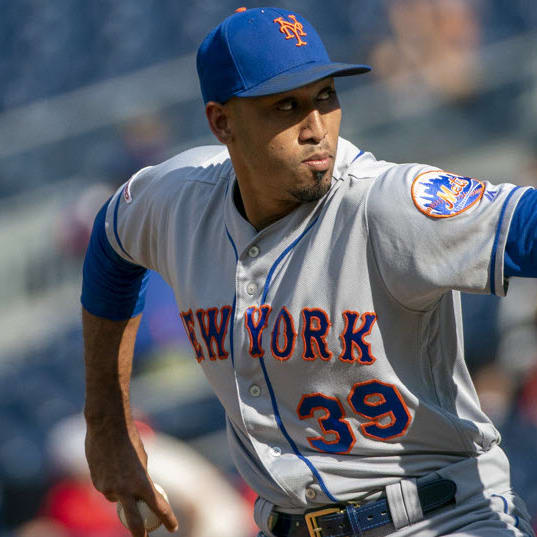This article is part of our Pitching 3D series.
With pitchers, all it takes is one start to taint an entire stat-line, as that one game still represents 12-15 percent of their starts for the season thus far. An outlier performance can cause a big wave in season stats, but it works in both directions, either with shutdown starts that cause the stat-line to shine or with massive explosions that blow up the ratios. It is critical this time of year to determine how much weight we give the 2016 stats as we assign player value, with trade season about to go into full swing and managers sizing up their rosters. In order to keep from letting one bad day at the office bias our take on a
With pitchers, all it takes is one start to taint an entire stat-line, as that one game still represents 12-15 percent of their starts for the season thus far. An outlier performance can cause a big wave in season stats, but it works in both directions, either with shutdown starts that cause the stat-line to shine or with massive explosions that blow up the ratios. It is critical this time of year to determine how much weight we give the 2016 stats as we assign player value, with trade season about to go into full swing and managers sizing up their rosters. In order to keep from letting one bad day at the office bias our take on a player, it seems helpful to know what the pitcher's numbers would look like if we booted the outlier start. It's like a professor dropping the lowest quiz grade, or as if the player had called in sick the day that he was scheduled to make a start. It's not that those starts didn't happen, but the extreme nature of the stats might be throwing off our valuations, at least in the extreme cases.
Many of these outlier games occurred in the first couple weeks of the season, but they left scars that will disfigure stat-lines far into the season. Part of this lean toward earlier starts was by design, as I wanted to eliminate those pitchers whose blow-ups are still fresh in memory (Jordan Zimmermann, Jon Gray) such that we can see exactly what the extreme starts have done to the pitcher's line. We'll break up the players in two groups: The Day It All Clicked and The Day It All Fell Apart.
THE DAY IT ALL CLICKED
Drew Smyly
Date: April 19
Opponent: at BOS
Game Stats: 8.0 IP, 0 ER, 1 H, 2 BB, 11 K
This was Smyly's greatest performance on so many levels. It tied his career-high in strikeouts, was just the second time in his career that he even pitched enough innings for the term "no-hitter" to be discussed, and in total he allowed just three baserunners against 24 outs. The icing on the cake is that he did this in Boston, against the highest-scoring lineup in the game and with the Green Monster looming, ready to turn a harmless fly ball into an extra-base hit at a moment's notice.
| ERA | WHIP | K | IP | |
| 2016 Stats | 3.44 | 0.99 | 58 | 49.2 |
| Game Removed | 4.10 | 1.10 | 47 | 41.2 |
Smyly followed up the performance with another 11-K gem, that one lasting 7.0 innings and resulting in a few runners crossing the plate. Otherwise, he's pretty much been good for a half-dozen innings and a half-dozen strikeouts each game, though he lacks much upside in the innings category (which inhibits his K's), particularly on a Rays club that will go to the bullpen early and often.
The strikeout rate is impressive even if the crème de la crème start is removed, representing an area where Smyly appears to have legitimately stepped up his game this season. The run prevention is a bigger issue
Vincent Velasquez
Date: April 14
Opponent: vs. SD
Game Stats: 9.0 IP, 0 ER, 3 H, 0 BB, 16 K
The secret code to unlocking a stat-altering start is to face the Padres, preferably in San Diego. The Pads have the lowest batting average in baseball, the lowest OBP, the second-worst slugging percentage and have the third-most strikeouts this season.
| ERA | WHIP | K | IP | |
| 2016 Stats | 2.42 | 0.99 | 59 | 48.1 |
| Game Removed | 2.97 | 1.14 | 43 | 39.1 |
Even removing one of the greatest starts that any pitcher has had this season, Velasquez impresses with his overall ratios and strikeout frequency. If the alarm failed to go off and he slept through the game, the resulting stat line would still be far better than most expected from him this season. However, the stats from the gem against the Padres make his overall line look incredible, and though his upside to produce such an outing should not be denied, the "game removed" stats appear to be a better approximation of what to expect from the right-hander for the next several starts.
Velasquez will likely be shut down after a modest innings count, a factor which will limit his full-season value, but he looks to be a legitimate option as long as he's on the mound. His pitch efficiency is especially encouraging, and though he has never gone more than 6.0 innings or 103 pitches aside from the Padres game, the fact that he has reached the 6.0-inning mark in five of his other seven games while keeping his pitch count in check bodes well for his in-game fatigue. Even if he turns out to be a 3.00-ERA pitcher with a 1.15 WHIP and a K-per-inning the rest of the season, the Phillies would have to consider themselves winners of the Ken Giles trade, and that's before accounting for the additional pieces that Philadelphia was able to swing in the deal.
Jamie Garcia
Date: April 14
Opponent: vs. CHC
Game Stats: 9.0 IP, 0 ER, 1 H, 1 BB, 13 K
Garcia has been a very effective pitcher, and though the thought was that he played over his head last season, he is doing his best to suppress any pessimism regarding his performance this year. He has not traditionally been much a strikeout pitcher (career K/9 of 7.2), but on April 14 he channeled his inner strikeout-demon. If only for a day, Garcia was king of the mountain, tossing a shutout against the top-scoring team in the National League, striking out 13 batters and allowing just two baserunners.
| ERA | WHIP | K | IP | |
| 2016 Stats | 2.86 | 1.03 | 51 | 50.1 |
| Game Removed | 3.48 | 1.21 | 38 | 41.1 |
It's a common refrain with this group by now, but Garcia's numbers are solid even without the gem that will likely stand as his best start of the season. He moves from the good side of the K-per-inning ledger to the other side, and if culling his best outing this year then we are left with a pitcher whose middling ERA and non-impressive WHIP takes him off the top shelf of pitchers. To be honest, he doesn't belong there anyway, and when looking at his career game log the April 14 outing sticks out like a sore thumb. Consider that he hadn't struck out double-digits since April 2014, and that prior to the Cubs game this season his previous career-high was an even 10 strikeouts. He must have sold his soul for a day, because even if he could replicate the baserunner stinginess, there is very little likelihood that Garcia could rack up another 13 K's in a start this season.
THE DAY IT ALL FELL APART
Steven Matz
Date: April 11
Opponent: vs. MIA
Game Stats: 1.2 IP, 7 ER, 6 H, 2 BB, 1 K
Matz wasted no time before digging himself a deep hole in the land of value, getting rocked for seven runs without escaping the second inning of his first start of the season. Since that fateful day, however, he has been on fire, never giving up more than two runs while posting a bunch of zeroes on the scoreboard.
| ERA | WHIP | K | IP | |
| 2016 Stats | 2.86 | 1.18 | 35 | 34.2 |
| Game Removed | 1.09 | 1.00 | 34 | 33 |
The pressure on Matz is alleviated by the star-stacked rotation of the Mets, such that he can slot in just about anywhere and more than hold his own. He has been extremely tough on batters, in general, but on this day they had their way with him. He has done so well, in fact, that it magnifies the impact of his bad day, which has been responsible for seven of his 11 runs allowed this season and from which Matz has been recovering since his first game of the year. We are dealing with an extra-light sample here, but he has been absolutely untouchable at times and should be treated as such a high commodity.
Gerrit Cole
Date: May 2
Opponent: vs. CHC
Game Stats: 4.2 IP, 5 ER, 6 H, 4 BB, 6 K
Facing the Cubs has been a common theme among pitchers with disaster starts on their resumes. Cole's outing was obviously subpar, particular in the walks department, but the impact to his overall line is undeniable.
| ERA | WHIP | K | IP | |
| 2016 Stats | 3.05 | 1.16 | 39 | 41.1 |
| Game Removed | 2.21 | 1.04 | 33 | 36.2 |
The heavy dent to the numbers is due to the fact that Cole has fewer innings pitched than many of the others on this list, so the one bad outing is having a larger relative impact. His overall line is strong despite the rocky start, but it's particularly impressive when considering his performance in the other half-dozen starts this season. It's tempting to shrug our shoulders and write off the performance as a figment of small samples and random variation, particularly considering the exceptional offense of the Cubs. The difference between his actual stats and the augmented version is essentially the difference between solid no. 2 starter and potential Cy Young candidate.
Carlos Rodon
Date: April 18
Opponent: vs. LAA
Game Stats: 0.1 IP, 5 ER, 6 H, 2 BB, 1 K
Prior to the season, I predicted that Rodon would shave at least a full walk from his BB/9 rate, and so far this year he is making good on that prediction by reducing it from 4.6 BB/9 to 3.4. The rate is still too high, but it also represents massive improvement in terms of the hitter-pitcher interface.
| ERA | WHIP | K | IP | |
| 2016 Stats | 4.73 | 1.47 | 47 | 45.2 |
| Game Removed | 3.77 | 1.30 | 46 | 45.1 |
This particular game was over almost as soon as it started, as Rodon was only able to register one out before he was sent packing. The game disfigured Rodon's ERA by nearly a full run, and had a ripple effect that would have knocked his WHIP all the way down to 1.30 when looking at the "what if" scenarios. Obviously the strikeout rates were hardly impacted by this one-out game, but the proposition of rostering Rodon in DFS or season-long fantasy would feel like a much more comfortable scenario if he had called in sick to work and missed that day. His ratios without that game are decent, especially when consider the K-per-inning rate, but this case seems like it's all about avoiding the downside rather than capturing the upside.









